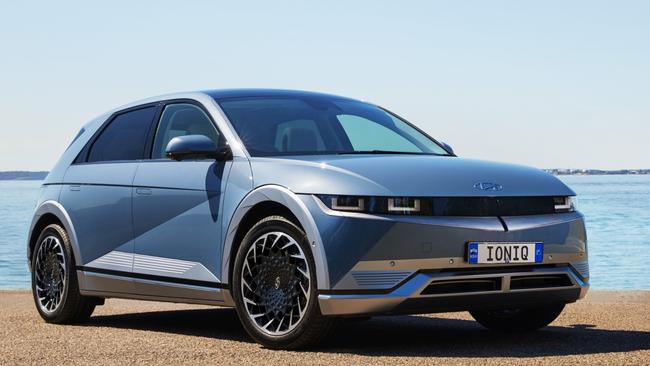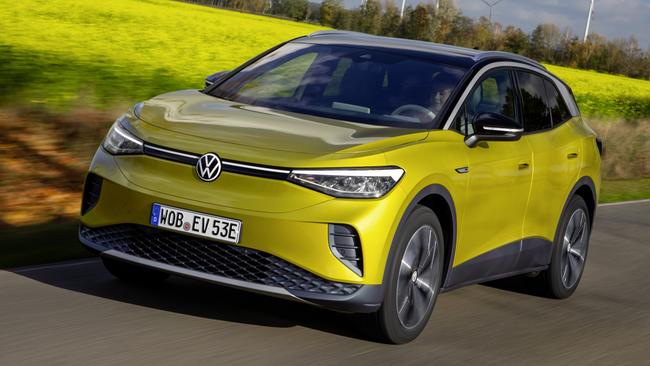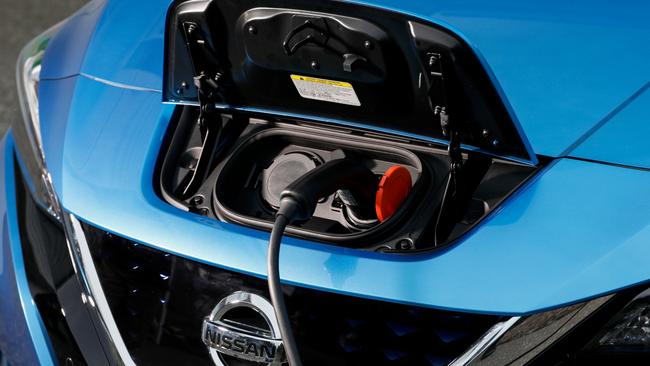Why PM’s electric car move for Aussies misses the mark
Industry experts say Scott Morrison’s EV policy will have little or no impact on the cars we drive over the next decade. Here’s why.
Motoring News
Don't miss out on the headlines from Motoring News. Followed categories will be added to My News.
The Federal Government’s EV policy will have little or no impact on the cars we drive over the next decade, according to industry experts.
The Morrison government has committed to spending $250 million on EV charging infrastructure, but experts say the move will do little to boost sales of EVs.
The infrastructure investment removes one barrier to EV uptake – range anxiety – but does nothing to address the single biggest barrier – affordability.
In simple terms, electric vehicles are roughly $20,000 to $30,000 more expensive than their petrol equivalents.
That gap will narrow in the next few years, but at the moment EVs are an indulgence for the wealthy.

The government’s EV strategy has critically steered clear of introducing cash incentives for EV buyers and has shied away from mandating a CO2 target for manufacturers.
Without either of these, experts argue, there will be no flood of electric vehicles onto our roads.
In Europe, regulators have adopted a “carrot and stick” approach to the introduction of EVs. They wave a carrot in front of buyers in the form of cash incentives and brandish a stick at manufacturers by way of financial penalties for not meeting CO2 targets.
The net result is that European buyers have a choice of roughly 130 electric vehicle models and we have 30, many of them luxury cars out of the reach of consumers.
With global demand for EVs outstripping supply, car makers are finding they can’t secure stock for the Australian market from head office.

The chief executive of the Federal Chamber of Automotive Industries, Tony Weber, said the government had missed an opportunity to apply a vehicle emissions standard that set a clear target to the industry.
“Around the world, emissions targets are a clear sign of a government’s intent to reduce emissions and sends a positive signal to automotive manufacturers to provide more electric-powered vehicles to those markets. This is exactly what is needed in Australia.” Mr Weber said.
He said the government’s target for EVs to be 30 per cent of new vehicle sales by 2030 was “extremely optimistic.”
“We strongly urge the Government to adopt the FCAI’s existing voluntary emissions standard which sets a clear pathway towards lower CO2 emissions across the entire passenger and light commercial fleet through to 2030.“
Volkswagen says it won’t be introducing its two most affordable EVs into Australia any time soon, because they are going to markets with incentives and targets.

That means uptake of EVs in Australia is unlikely to accelerate in the short term. At the moment they make up less than 2 per cent of new-car sales.
The Electric Vehicle Council says the Morrison policy is “a fizzer”.
Chief Executive Behyad Jafari says the federal strategy ignores the most effective measures to improve electric vehicle uptake.
“If it contained fuel efficiency standards and rebates it would give Australians more choice. The best and most affordable EVs manufacturers are producing would make their way swiftly onto our market,” he said.
“Fuel efficiency standards are the absolute bare minimum of what you would expect in any 21st century plan.
“If Australia continues to be one of the only developed nations without fuel efficiency standards then we will continue to be a dumping ground for the world’s dirtiest vehicles. It’s sadly that simple.”

In Europe, cars must meet a mandatory target of 95g/km of CO2. Australia has no target. Instead there is a voluntary goal set by the car industry of 100g/km by 2030.
The lack of a national strategy means that electric vehicles will be more attractive to buy in some states than others.
In NSW, early EV adopters are eligible for a $3000 rebate and a stamp duty exemption, which can cut another $2000 from the cost of a new EV.
Victorian EV buyers also get a $3000 rebate, but have to pay a road tax based on how many kilometres they drive.
South Australians are entitled to a $3000 rebate and won’t have to pay a road user tax until EVs reach a critical mass on the roads.
Western Australia has no incentives for EV buyers, while Queensland offers registration and stamp duty discounts.
Volkswagen Australia chief executive Michael Bartsch said the lack of a cohesive national strategy with incentives and rebates is hampering EV sales.
“Lack of national regulation means that in terms of electric vehicles, Australia is subject to a patchwork of disparate regulations,” he said. “NSW has a world class EV adoption policy; Victoria has the world’s worst. Zero and low emission vehicles ownership is encouraged on one side of the Murray and taxed on the other.”
Hyundai spokesman Bill Thomas said the commitment to infrastructure development was a positive sign but more could be done to boost EV sales.
“Rollout of infrastructure is critical to increasing ZEV adoption in Australia as we begin to build consumer confidence in this new technology. However, more can certainly be done, such as an accelerated mandate for minimum fuel standards, which currently lag behind the rest of the developed world,” he said.
He said there had been a positive reaction from buyers to rebates introduced by State governments.
“Other advanced markets have shown how beneficial and popular these policies can be,” he said.
More Coverage
Originally published as Why PM’s electric car move for Aussies misses the mark
Read related topics:Scott Morrison





